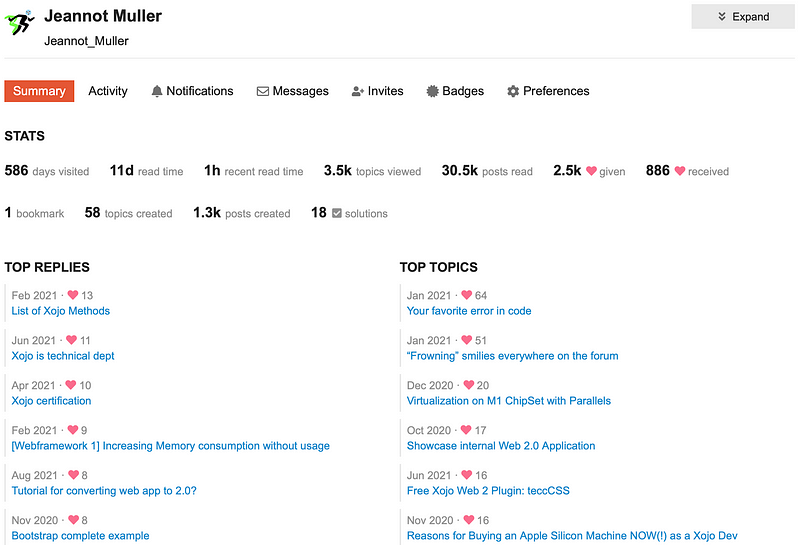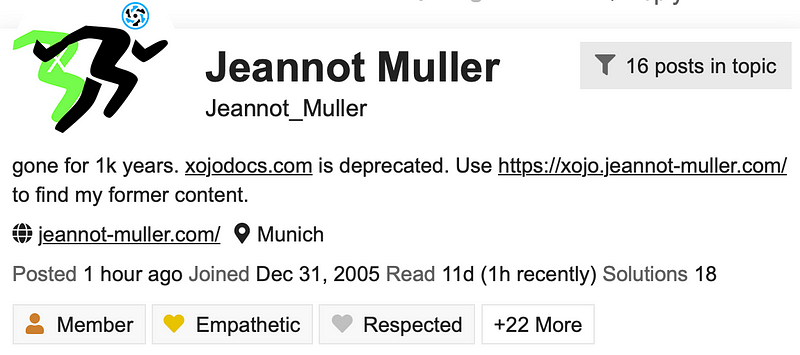XOJO — My Final Review
 Jeannot Muller
Jeannot Muller
As a former “fanboy” and defender of some Xojo decisions, I consider it fair to share my assessment after a year of silence here and on their support forum.
As many are aware: I moved mainly to a quasar.dev stack for Web, with Go and Nodejs as the backend, and I could not be happier. Especially as quasar offers the possibility to compile as well for mobile (iOS AND Android), and Desktop (granted Electron based, but who cares in 2022).
In addition, I also looked at Java. With Java you are certainly better future-proof, especially when it comes to documentation and if certifications and ISO standards are important to your business.
In any case, there are numerous options, you just have to overcome your own weaker self.

Yesterday I was active again on the support forum after a long time, but I still don’t see that the actual problem is recognised and for that reason, alone my decision to move my business away seems right.
The problem is that it’s not fun to be critical. On the one hand, it is in my opinion not seen as constructive criticism but fizzles out without consequences.
Xojo has always had a loyal customer base that has been through thick and thin for a very long time and showed a lot of understanding when, for example, sudden “strategy changes” by Apple surprised the company.
About 3–4 years ago, at least PRO users had to get the impression that they were less, if at all, in focus.
As a result, even Xojo Inc. is now saying that their tool is “low code” (IMHO that’s technically and factually simply wrong — but that’s me). I have to read between the lines on the forum that developers and consultants who based parts of their business on Xojo, unfortunately, do not (anymore?) belong to their target group when problems arise.
The only way I can explain it is that Xojo Inc. finally understands how a robust, resilient and predictable development process and work chain should work on the part of the customer and that the company realises that it cannot keep up here. Whether they admit it directly or indirectly is secondary. Unfortunately, the facts and practical experience of recent years speak their language for many of the veteran users.
Xojo is certainly brave enough to deal with many of the industry-imposed changes, everyone on the dev team is working very hard (thank you!), but manufacturers and users alike would have to realise that in the eye of the hurricane, unfortunately, there is always a deceptive calm only.
I’m not a fan of just complaining and not pointing out any solutions. On the one hand, only a manufacturer can do this, but ideally in collaboration with experienced users who know what the market “needs” and might help give precious feedback. For me, a stable version that is constantly being improved and a parallel, experimental version with new features seem to be the successful path that many others are taking to incorporate the optimised new functions into the core stable version at a later date. Web 1 is a good example. Many of us waited for the new version to get bugs fixed. What we got is a brand new tool, with a completely different approach but no migration path. It’s sink or swim.
Of course, there will also be times when you have to make such a massive change because the industry and innovation are forcing you to do so (and that was very true for the outdated Web 1 too! — It is a fact that the change was inevitable on the long run, actually as so often with Xojo it was undeniable).
Not only did every veteran understand that, but it was also clear to us that contrary to the supposed “promises” Web 1 had died with the release of Web 2 (on day ONE!). In this respect, no one is complaining that there were no more patches, only the annoyance is expressed that one cannot build a business on spongy and sometimes contradictory statements, might they get marketing-washed or not.
But market leaders then often still offer security patches and fixes for severe bugs for the old technological stack, at least for a few years.
Open source proof of concepts on the other hand can afford the luxury that their products are pure alpha/beta versions and that all end users help with the optimization. But you can’t build a business on that, at least I can’t. Many of those companies just die, and a few alter to a sustainable solution, with professional release processes in place.
Love it, change it, or leave it.

Obviously, I put a lot of love into Xojo. I failed in trying to change things to the better, so it was about time to move on.
We have to accept that Xojo seems to favour the current path of their release model which unfortunately always does feel like betas. As a user, you have to submit to the constant optimisation process and a stable version without new features but bug fixing only doesn’t seem to be — nor to ever become — the desired strategy of Xojo Inc.
Naturally, this is only my conclusion, based on the development, observations and experience over the last few years. Of course, it may be that I simply lack the intellectual and professional ability to grasp the “big picture”. Time will tell.
But I admit that I didn’t take my decision lightly. Every change is painful, and it is always exhausting to admit one’s own mistakes. And I had overall invested at least 10k EUR into the Xojo eco-system since 2005. However, this applies to all parties involved, so the increasing nervousness and the obvious and documented inconsistencies in the company “statements” on the Xojo forum do not surprise me.
If you want to contact me, you will find me on GitHub and here, or on INN.
As was the case last year, I will no longer jeopardise the peace on the xojo forum. I am very happy to recommend INN to newcomers because there you can speak openly and statements are analysed critically and mostly fairly.
My posts and publications will remain and on github.com (https://github.com/Jeannot-Muller), but please understand that I will no longer maintain them.
If you have challenges with the deployment of Xojo Web Apps, I refer you to the inexpensive and very good LIFEBOAT tool.
With that everything is said from my side and I disappear back into my corner of insignificance.

Subscribe to my newsletter
Read articles from Jeannot Muller directly inside your inbox. Subscribe to the newsletter, and don't miss out.
Written by

Jeannot Muller
Jeannot Muller
Founder and Managing Director at TECcompanion GmbH